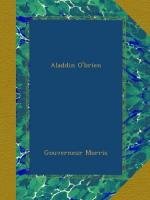The Peninsular campaign developed four kinds of men: the survivors, the wounded, the dead, and the missing. When the campaign was over Aladdin sometimes woke starting in the night to think of those missing and of what he had seen in the woods.
XXIV
The tedious locomotion of an army and the incessant reluctance of the battle to be met will try a sinner; but a scarcity of tobacco and constantly wet feet will try a saint. Aladdin was somewhat of both. But in the fidgety gloom which presently settled upon man and beast, his, great Irish gift of cheerfulness shone like a star. He even gave up longing for promotion, and strained his mind to the cracking-point for humorous verses and catching tunes. He went singing up the Peninsula, and thumped the gay banjo by the camp-fire, and was greatly beloved by the foot-sore and sick. He had given up worrying about what he would do in battle, for there were much more important things to think about.
Battles are to soldiers what Christmas trees are to children: you must wait, wait, and wait for them, and forever wait; and when they do come the presents are apt to be a little tawdry. And you are only envied by the other little children who didn’t really see what you really got. The most comforting man in the army was one minister of the gospel, and the most annoying was another. The first had the divine gift of story-telling and laughter, and the second thanked God because the soldiers had run out of their best friend, tobacco, which he described through his nose as “filthy weed,” “vile narcotic,” or “pernicious hell-plant.” And they both served the Lord as hard as they could—and they both suffered from dysentery.
As the days passed and the temperature of the army rose, and its digestion became permanently impaired, Aladdin, by giving out, and constantly, all that was best in himself, became gradually exhausted. He found himself telling stories as many as three times to the same man, and he began to steal from the poets and musicians that he knew in order to keep abreast of his own original powers of production. He even went so far as to draw inspiration from men of uneven heights stood in line: he would hum the intervals as scored by their heads on an imaginary staff and fashion his tune accordingly, but this tended to a somewhat compressed range and was not always happy in its results. His efforts, however, were appreciated, and the emaciated young Irishman became a most exceptional prophet, and received honor in his own land.




